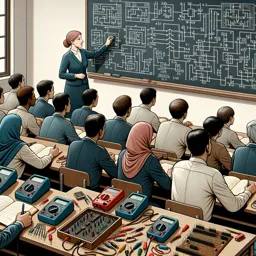Introduction to Advanced Electronics
Advanced electronics represent the pinnacle of both practical knowledge and theoretical understanding in the electrician profession. Moving beyond the basics, advanced electronic concepts are crucial in many high-tech industries, including automation, telecommunications, and industrial control systems. In this article, you’ll discover what advanced electronics involve, their importance, and the pathways for electricians to leverage these skills for career advancement.
What Defines ‘Advanced Electronics’ for Electricians?
While basic electronics cover fundamental components like resistors, capacitors, and simple circuits, advanced electronics branch into sophisticated systems and emerging technologies. Electricians with advanced skills work with microcontrollers, programmable logic controllers (PLCs), sensor integration, embedded systems, and digital signal processing. These technologies form the backbone of modern automated manufacturing, building management systems, and smart grids.
Advanced Circuit Design and Troubleshooting
One hallmark of advanced electronics is the ability to design and troubleshoot complex circuits. Electricians learn to interpret schematics for multi-stage amplifiers, power supplies, and communication interfaces. They also master the use of diagnostic instruments such as oscilloscopes, logic analyzers, and spectrum analyzers, enabling precise identification and resolution of sophisticated electronic issues.
Automation and Control Systems
Automation plays a significant role in advanced electronics. From PLC programming to integrating IoT (Internet of Things) devices within industrial machinery, electricians with advanced knowledge oversee the installation and maintenance of these advanced control systems. Mastery of programmable devices not only increases efficiency but also improves safety and productivity in the workplace.
Opportunities in Advanced Electronics
Electricians who specialize in advanced electronics find opportunities in numerous sectors: manufacturing automation, renewable energy systems, smart buildings, and telecommunications infrastructure. This skillset is highly sought-after, opening doors to supervisory roles, technical consulting, and project management positions. Upskilling in advanced electronics often leads professionals into innovative industries where high-level problem-solving is valued.
How to Get Started?
To begin learning advanced electronics, electricians can enroll in specialized professional courses covering topics such as microcontroller programming, industrial networking, and real-time system analysis. Hands-on labs and project-based assignments help solidify theoretical knowledge with practical experience. By pursuing ongoing education, electricians ensure they remain competitive and up-to-date with the latest technological advances.
Conclusion
Advanced electronics offer electricians a pathway to broaden their expertise and tackle new challenges in a variety of industries. By investing in continuous learning and mastery of sophisticated systems, professionals in this field drive innovation and ensure long-term career success.































